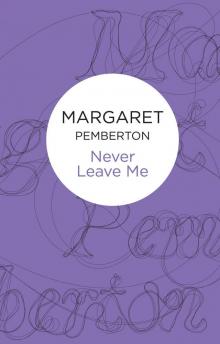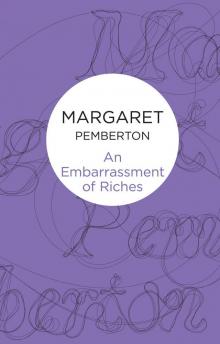- Home
- Margaret Pemberton
White Christmas in Saigon Page 4
White Christmas in Saigon Read online
Page 4
Serena smiled. Despite her indifference to almost anything and everything, she loved Bedingham passionately. It had been in her family ever since the sixteenth century when Matthew Blyth, an adventurer, had been rewarded by Henry VIII for dubious services rendered, and been given permission to acquire and domesticate the dissolved abbey of Bedingham in Cambridgeshire. He had done so with zest, transforming Bedingham into a house fit for royalty.
Under Mary’s reign, when upstart Anglicans were out of favour, Bedingham had suffered and lost the major part of its more glittering trappings, but under Queen Elizabeth I, favour had been restored and more land acquired. Through a satisfactory marriage alliance Blythes became Blyth-Templetons. Under Charles I, the Blyth- Templetons being royalist, Bedingham suffered a minor setback, but after the accession of Charles II, its star entered its zenith. The family was ennobled, an east and west wing were added, and the elaborate formal gardens around the house conceived and executed.
Under the boring rule of the Hanoverians, Bedingham had lost a little of its grandeur, declining to play host to a royal family undeserving of it. Under Queen Victoria it had continued to flourish. A long library had been added to the house, and more avenues and follies added to the grounds. Only in the last century had true difficulties arisen, and these, being financial, Serena’s grandfather had sensibly solved by marrying the only daughter of an American railway king of Swedish descent.
Serena patted the ancient stone sill of the mullioned window. After playing host to Tudors, Stuarts, Saxe-Coburgs, and Edward VII, Bedingham was now going to play host to the Rolling Stones. ‘You’ve seen a lot,’ she said affectionately to the ivy-covered bricks and mortar, ‘but in four hundred years you won’t ever have seen anything quite like this!’
There was a perfunctory knock at the door, and without waiting to be asked to enter, her brother strolled into the bedroom, his thumbs hooked into the pockets of his jeans, his hair shoulder-length. ‘Hell of a lot of noise, isn’t there?’ he asked cheerfully. ‘The old man is going to open the gates at eight to relieve the pressure building up in the village. Apparently the local roads are already jammed. Hundreds of those coming to the concert camped in surrounding fields last night. I don’t suppose we’ll be at all popular with our farmers.’
Serena shrugged, indifferent to the wrath of the farmers who tenanted Bedingham land. ‘What time does the concert get under way?’
‘Ten o’clock, but what you really mean is what time does Jagger arrive?’ Lance flung himself facedown on the rumpled bed and rested his chin in his hands. ‘Two o’clock, supposedly. Until then, the fans have to be content with lesser mortals.’
‘He is staying on, isn’t he?’ Serena asked, turning away from the window and rummaging in the drawer of a George III mahogany chest for a pair of jeans and a T-shirt. ‘I mean, he is coming to the ball?’
‘He’s been invited and the word is that he’s accepted, but I can’t quite see it, can you?’ Lance asked, grinning at her speculatively as she pulled the jeans on beneath the discreet cover of her nightgown. Ever since she had returned home on vacation from her Swiss finishing school, she had been at pains to let him know how shockingly sexually experienced and liberated she had become. It amused him that her sexual liberation didn’t extend to himself and that, where he was concerned, proper sisterly modesty was still the order of the day.
Serena, aware of his amusement and knowing very well what had caused it, pulled her nightdress defiantly over her head, her breasts gloriously naked as she reached for her T-shirt with a studied lack of hurry, not bothering to keep her back towards him. ‘Why shouldn’t he accept?’ she asked. ‘HRH has accepted, hasn’t he?’
A flare of shock, like an electric current, had run through him. Her breasts were small and high, her nipples so pale as to be almost invisible. They needed biting into to gain colour. He found the mere idea cripplingly erotic. ‘Yes,’ he said, wondering why incest had never entered his thoughts before. ‘Prince Charles is coming.’
The ball that was to follow the concert was to be the kind of ball that Bedingham was accustomed to. Dress would be formal, the young bloods of England’s oldest families would be in attendance, a carefully selected sprinkling of stage and screen stars were invited to add glamour to the evening.
Serena pulled her T-shirt down over her head. Wondering why he had never before realized the strength of his sexual feelings for his sister, Lance said, ‘Why you should think Charles’s presence guarantees a fun evening, I can’t imagine.’ Lance’s views of the Windsors were on a par with his ancestors’ views of the Hanoverians. They were bores and he could well do without them.
Serena surveyed her reflection in a walnut-framed cheval glass. ‘I like Charles,’ she said unexpectedly. ‘He might be a stuffed shirt, but he’s a sincere stuffed shirt.’
Lance temporarily forgot the fascinating path down which his thoughts were taking him and rolled over on to his back, shouting with-laughter. ‘Oh, God, Serry! Don’t tell me you have ambitions in that direction! I couldn’t bear it! Queen Serena! What a hoot!’
‘I think I would make a very good queen,’ Serena said, sweeping up her long, pale gold mane of hair and piling it experimentally on top of her head. ‘A tiara would suit me.’
‘Bollocks!’ Lance said disrespectfully, ‘the days of Blyth-Templetons fawning to royalty are over, thank God. What we need in the family now is some good, unadulterated, revolutionary blood!’
Serena let her hair fall back down to her shoulders. She adored Lance and always had. He was the most important person in her life, but he bored her when he got on his political soapbox. She frowned slightly as she searched in the bottom of her French armoire for a pair of white leather high-heeled boots. Perhaps it wasn’t so much boredom as resentment. Until his political involvement with the far left, they had always been in complete agreement about everything.
As children they had often been left for long periods in the care of nannies and au pairs and housekeepers while their parents had cruised the Mediterranean, skied in Switzerland, or shot grouse in the Scottish Highlands. They had been totally dependent on each other for companionship and affection and had grown up with the unswerving attitude that it was the two of them against the rest of the world. The unity that bad been forged between them as children was still the most important thing in their lives, and Serena had tried hard to share his left wing passions. She had failed. Politics, even revolutionary politics, bored her.
She found the boots and pulled them on. Except for politics they had always been alike in everything. Both of them were tall and slender, light-skinned and blond-haired. In Lance this had resulted in a certain air of effeminacy, and Serena often thought that one of the reasons for his radical left wing views was that he thought they gave him a harder, more macho image.
There was nothing pale and washed out about the combination of Serena’s Nordic and Anglo-Saxon beauty. There was strength as well as delicacy in her fine-boned features, and the Swiss sun had given her skin a luminous honey-gold tone. Her eyes were grey, wide-set, dark-lashed, their smoky depths alight with fiery recklessness. When she moved she did so with utter assurance, carrying her tall, superbly proportioned body with the arrogance and ease of a dancer or athlete.
She lifted the two dresses that had been hanging on the front of her armoire, and that she had moved in her search for her boots, back into position. Both were white. One bore a Mary Quant label and was so minuscule as to border on the indecent; the other bore a Norman Hartnell label and was of heavy satin, ankle-length, and encrusted with thousands of tiny seed pearls. The Mary Quant was the dress she intended to wear for the concert; the Norman Hartnell was the gown she was to wear for the ball. She looked at the dresses in happy anticipation, knowing that they said a lot about her. They were at opposite ends of the fashion spectrum, yet she thought them equally wonderful. She liked extremes. It was safe, middle-of-the-road moderation that she couldn’t stand.
‘Our house guest
s, the Andersons, arrived while you were living it up in town last night,’ Lance said, wondering if Serena would be disturbed if she knew the way his thoughts were turning, or if she perhaps shared his agonizingly erotic fantasy. ‘Pathetically small-town America despite their millions and their boast of being one of Boston’s oldest families.’
Since Lance had spent the last few months denouncing America and Americans with the same arbitrary passion he mustered to denounce the British police force, his verdict on their house guests was not surprising.
‘Where does their money come from?’ Serena asked with interest.
The American ability to rise from pauper to millionaire in a single generation fascinated her. Their own great-grandfather had been a penniless Swedish immigrant when he had arrived in America, yet when he had died he had left his daughter a fortune so large that Bedingham and they were still thriving on it.
‘Banking,’ Lance replied. He shrugged, then sat up on the bed, swinging his legs to the floor. ‘But the family fortune is bolstered by whisky. The grandfather picked up a whisky franchise in Scotland during the last days of prohibition. When prohibition conveniently ended, he became a millionaire overnight.’
‘He was taking a risk,’ Serena said, pulling a comb through her slick-straight hair. ‘What if prohibition hadn’t ended? What would he have done with his whisky franchise then?’
‘He was in politics,’ Lance said dryly. ‘He knew prohibition was going to end.’
Serena gave a deep-throated chuckle. ‘I think I would have liked the grandfather. What is the grandson like?’
Lance shrugged again, suddenly sure that Serena would also like the grandson. He didn’t like the idea. ‘He went to Choate, he’s at Princeton now and he thinks England is an anachronism.’
‘If he’s at Princeton, he can’t be that dumb,’ Serena said, tossing her comb down on to the Lalique tray on her dressing-table, ‘and if he thinks England an anachronism, I would have thought you would have been in total agreement with him. After all, you’re the one who wants to bring the country to its knees and revolution to the streets!’
‘Maybe so, but I don’t need a bloody American to help me do it!’ he said, throwing a pillow at her.
Serena sidestepped the pillow with ease. ‘Come on, brother mine,’ she said, striding towards the door, her breasts pushing tantalizingly against the thin cotton of her T-shirt. ‘Let’s make sure Bedingham is ready for its day of glory.’
That Bedingham would be among the first buildings to be put to the torch if Lance and his fellow revolutionaries ever had their way was something never mentioned between them. When Lance was with his left wing friends, he always and loudly disowned Bedingham, vowing that when his father died, he wouldn’t accept his hereditary title, and that for all he cared, the house could be reduced to a pile of rubble. It was a statement he never made in front of Serena. He knew how much and how deeply she felt about Bedingham. It was a measure of how deep his feelings were for her that he never talked rashly of Bedingham’s future in her presence. They walked down the sweeping staircase, through the large inner hall and then through the entrance hall, its floor tiles emblazoned with the Blyth-Templeton family motto and crest. Even though the concert was not due to start for two hours, they could hear music.
‘The music is coming from transistor radios,’ Lance said as they stepped out on to the stone steps of the south entrance. ‘My God! Look at the crowd pouring down from the gates! What is it going to be like when things really get under way?’
‘It’s going to be fabulous!’ Serena said, her eyes shining as she ran down the steps towards the gravel dividing the house from the lawns fronting it.
The gates that her father had opened at eight o’clock were so far distant they couldn’t be seen, but the first of the fans to stream through them were already making their way down through the avenue of elms, towards the lawns and the stage.
She Loves You was blaring out from a score of transistor radios, and Roy Orbison blared from dozens more on a different station.
‘Hey, want a joint?’ the first of the invaders to reach the front of the house, a long-haired individual wearing an Afghan coat and a multicoloured headband, shouted across to her.
‘I’d love one!’ Serena responded enthusiastically, accepting the sweet-smelling marijuana and drawing deeply on it while Lance looked at her, not knowing whether to be amused or annoyed, ‘Wouldn’t breakfast be more suitable?’ he asked. ‘It’s barely the crack of dawn.’
Serena sucked down another lungful of smoke. ‘It may be more sensible, Lance, but it will also be boring and I’m going to do nothing today which is boring. Today all I’m going to do is have fun, fun, fun!’
At tea o’clock her father announced that the concert was to begin – but he did so, Serena thought, with the air of a drowning man bereft of all help.
Masses of singing, shouting, dancing bodies covered the lawns surrounding the stage, and the grassy hill and avenue beyond. There was tight security around the house. Uniformed police were at every entrance, and there were large No Admittance signs on all the doors. Her father, after his dazed declaration that Bedingham’s pop festival was officially under way, had reeled into the house, unable to believe that his simple project for bringing in extra income could have turned into such a monster. Never in a million years had he expected so many thousands of young people to throng to Bedingham. He couldn’t even begin to imagine where they had all come from. And never had he imagined that music could be so excruciatingly, so shatteringly, loud.
‘It’s unbelievable!’ he said weakly to Serena as they passed on the stairs. ‘A sea of unwashed, half-naked humanity stretching as far as the eye can see.’
‘It’s a hot day,’ she said practically, ‘and if the new class of punters is beginning to get you down, just think of all the lovely lolly they’re bringing in.’
Her father already had. It was his only consolation.
‘But the grounds,’ he moaned, clinging to the banister. ‘There won’t be a blade of grass surviving by the time it’s over!’
She patted his arm. ‘Bedingham survived the Civil War,’ she said comfortingly, ‘and it will survive the Stones. Stop worrying, Daddy. Enjoy yourself.’
‘Serena!’ he called out after her as she continued buoyantly on her way. ‘Our house guests! Are you taking care of them?’
‘Haven’t even seen them,’ Serena responded, not halting in her march for the door. ‘I should have a whisky if I were you, Daddy,’ she added over her shoulder. ‘It will steady the nerves.’
Her father groaned and turned toward his study. Serena’s was the first sensible suggestion anyone had made since the debacle had begun.
As Serena ran lightly down the sweeping stone steps of the south entrance, past the policeman on duty, she had a bird’s eye view of the rear of the stage. It was packed with sound equipment and back-up musicians, and one of them, a tall, languid-looking man about her age was so striking-looking he attracted and held her attention despite the press of people around him.
He was standing at the very edge of the rear of the stage, leaning nonchalantly against an amplifier, his thumbs hooked into the pockets of his jeans, one foot crossed over the other at the ankle.
His negligent stance, and his air of bored indifference in the midst of such fevered excitement, reminded her of Lance, though that was as far as the similarity went. The musician’s hair was blue-black, falling low across his brow, and despite his slender build, there was a sense of power under restraint about him, an animal-like magnetism that Lance conspicuously lacked.
The Animals had just bounded on to the front of the stage; the roar of applause and shouting and stamping was deafening. As Erie Burden’s raw, unmistakable voice gave vent to the first line of House of the Rising Sun, Serena smiled to herself.
The musician might not be a famous name, but he obviously had other more than compensating qualities. And Serena saw no reason why she shouldn’t enjoy them. By the
time she had reached the rear of the stage, Burden was reaching the last erotic, skin-tingling stanza of his song.
‘I’m Serena Blyth-Templeton,’ she shouted to the stewards who blocked her way. ‘Let me through!’
They responded to the authority in her voice almost immediately, but even so, by the time she squeezed around to the edge of the stage, her quarry had disappeared.
‘There was a musician here a few minutes ago,’ she shouted over the roar of applause to a still-perspiring member of the band who had preceded the Animals. ‘Do you know where he went?’
‘Haven’t a clue, love,’ he said, looking her up and down appreciatively. ‘Will I do instead?’
Beneath his stage makeup he had blemishes and there was a whiff of stale alcohol on his breath. ‘No,’ she said, softening the blow with a grin. ‘I’m sorry, but you won’t.’
He shrugged and laughed, and as Burden began to sing Don’t Let Me Be Misunderstood she philosophically abandoned her search and moved to the front of the stage, squeezing into the centre of the crush, dancing on the spot to the sound of the music, cheering until she was hoarse when the song came to an end.
As morning edged into afternoon, the heat became almost unbearable. ‘I thought it was supposed to rain every day in England,’ a powerfully built Australian yelled to her as they stood, arms around each other’s waists, swaying to the beat of the music.
‘It usually does!’ she shouted back. ‘But sometimes, just sometimes, we actually have a summer! This is it!’
Some girls had dispensed with their T-shirts altogether, dancing bare-breasted, shrieking with laughter as the occasional cooling bottle of beer was poured over them. Serena was tempted to take off the Quant mini-dress she had changed into just before the start of the concert. If she had been anywhere else, she would have done so. Only respect for Bedingham restrained her.

 The Summer Queen
The Summer Queen Moonflower Madness
Moonflower Madness The Londoners
The Londoners The Flower Garden
The Flower Garden Yorkshire Rose
Yorkshire Rose Vengeance in the Sun
Vengeance in the Sun Zadruga
Zadruga Beneath the Cypress Tree
Beneath the Cypress Tree Magnolia Square
Magnolia Square Party in Peking
Party in Peking Lion of Languedoc
Lion of Languedoc Forget-Me-Not Bride
Forget-Me-Not Bride The Guilty Secret
The Guilty Secret Rendezvous With Danger
Rendezvous With Danger A Season of Secrets
A Season of Secrets Silver Shadows, Golden Dreams
Silver Shadows, Golden Dreams The Four of Us
The Four of Us Devil's Palace
Devil's Palace Never Leave Me
Never Leave Me An Embarrassment of Riches
An Embarrassment of Riches African Enchantment
African Enchantment White Christmas in Saigon
White Christmas in Saigon Coronation Summer
Coronation Summer A Multitude of Sins
A Multitude of Sins Tapestry of Fear
Tapestry of Fear A Many-Splendoured Thing
A Many-Splendoured Thing